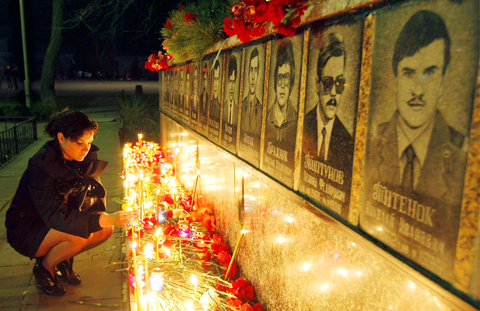Ukraine paid homage early yesterday to victims of the Chernobyl catastrophe 23 years after the worst nuclear accident in history.
“Today we remember with profound sadness those heroes who fought against the nuclear storm and sacrificed themselves for us and our children,” Ukrainian President Viktor Yushchenko said in an address published by his press service.
Some 100 Ukrainians, including Yushchenko and other top officials, laid wreaths overnight before the monument to Chernobyl’s victims in Kiev and lighted candles during a religious service dedicated to the tragedy.

PHOTO: EPA
The “liquidators” — men who took part in cleaning the site after the catastrophe — in their turn wound a long fir-tree wreath around the monument, many unable to keep back tears.
In Slavutich, a small town 50km away from the accident’s site where many of the power station’s personnel used to live, the night vigil gathered many hundreds who brought flowers and candles to the Chernobyl victims’ monument.
The disaster occurred on April 26, 1986, at 1:23am, when one of the reactors exploded — contaminating the Soviet states of Ukraine, Russia and Belarus, with the fallout also spreading to other parts of Europe.
More than 25,000 liquidators — most of them Ukrainians, Russians and Belarussians — died getting the accident under control and constructing a concrete shield over the wreckage, Ukrainian official figures showed.
A UN toll published in September 2005 set the number of victims at just 4,000, a figure challenged by non-governmental organizations.
In Ukraine alone, 2.3 million people are designated officially as “having suffered from the catastrophe.”
Some 4,400 Ukrainians, children or adolescents at the time of the accident, have undergone operations for thyroid cancer, the most common consequence of radiation, the health ministry said.
Chernobyl nuclear power station was finally closed in 2000 after one reactor had continued producing electricity. But the dead power station remains a threat because the concrete cover laid over 200 tonnes of magma, consisting of radioactive fuel, is cracking.
A new steel sarcophagus is due to cover the seal hurriedly flung over the reactor in the immediate aftermath of the disaster. Internationally funded construction of the new steel cover is due to be launched this year or early next year and completed by 2012 by the Novarka consortium including France’s Bouygues and Vinci companies.

‘UNUSUAL EVENT’: The Australian defense minister said that the Chinese navy task group was entitled to be where it was, but Australia would be watching it closely The Australian and New Zealand militaries were monitoring three Chinese warships moving unusually far south along Australia’s east coast on an unknown mission, officials said yesterday. The Australian government a week ago said that the warships had traveled through Southeast Asia and the Coral Sea, and were approaching northeast Australia. Australian Minister for Defence Richard Marles yesterday said that the Chinese ships — the Hengyang naval frigate, the Zunyi cruiser and the Weishanhu replenishment vessel — were “off the east coast of Australia.” Defense officials did not respond to a request for comment on a Financial Times report that the task group from

DEFENSE UPHEAVAL: Trump was also to remove the first woman to lead a military service, as well as the judge advocates general for the army, navy and air force US President Donald Trump on Friday fired the chairman of the Joint Chiefs of Staff, Air Force General C.Q. Brown, and pushed out five other admirals and generals in an unprecedented shake-up of US military leadership. Trump wrote in a post on Truth Social that he would nominate former lieutenant general Dan “Razin” Caine to succeed Brown, breaking with tradition by pulling someone out of retirement for the first time to become the top military officer. The president would also replace the head of the US Navy, a position held by Admiral Lisa Franchetti, the first woman to lead a military service,

Four decades after they were forced apart, US-raised Adamary Garcia and her birth mother on Saturday fell into each other’s arms at the airport in Santiago, Chile. Without speaking, they embraced tearfully: A rare reunification for one the thousands of Chileans taken from their mothers as babies and given up for adoption abroad. “The worst is over,” Edita Bizama, 64, said as she beheld her daughter for the first time since her birth 41 years ago. Garcia had flown to Santiago with four other women born in Chile and adopted in the US. Reports have estimated there were 20,000 such cases from 1950 to

CONFIDENT ON DEAL: ‘Ukraine wants a seat at the table, but wouldn’t the people of Ukraine have a say? It’s been a long time since an election, the US president said US President Donald Trump on Tuesday criticized Ukrainian President Volodymyr Zelenskiy and added that he was more confident of a deal to end the war after US-Russia talks. Trump increased pressure on Zelenskiy to hold elections and chided him for complaining about being frozen out of talks in Saudi Arabia. The US president also suggested that he could meet Russian President Vladimir Putin before the end of the month as Washington overhauls its stance toward Russia. “I’m very disappointed, I hear that they’re upset about not having a seat,” Trump told reporters at his Mar-a-Lago resort in Florida when asked about the Ukrainian